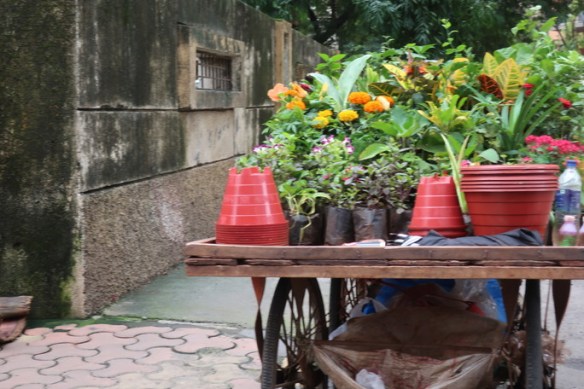Water is in the news quite a bit these days. Too little or none at all. Too much, too soon is just as bad. Certainly this is predicted to be the biggest, most critical problem we will have to resolve in the not too distant future. Water will direct the next mass migrations of humans as they are forced to adapt to the changing weather patterns – a result of both natural and man-made acts. As a global community we will have to decide right now how we will deal with shifting populations/refugees, how we grow our food, utilize energy, reprogram our use of water and indeed our entire way of living. While government agencies and related organizations grapple with the big picture, if one has not personally begun taking steps towards this impending crisis, it is now time to start. As of this minute. I’m not being an alarmist – the snooze button to that alarm has been hit way too often already.
I’m writing this during a ten day stay in monsoon swamped Mumbai. It is wet, warm and muggy. The air feels spongy even when it isn’t raining. The dampness pervades everywhere. Without air-conditioning to lower the humidity, I’d be hard pressed to be comfortable and sleep would be impossible. This has been a particularly heavy monsoon season.
Despite so much rain, the city is still aware of the undependable nature of its water supply. It has signs all over asking her citizens to conserve, avoid waste and respect this life giving Adam’s Ale. And that got me wondering if those signs have any real impact on the mass. Does one read and/or pay attention to such ‘nudges’? As one drives through the generally thick traffic, is the mind even open to receiving any such advice? It then occurred to me that it was because of the stop and start, slow moving, thick traffic snaking along that I was able to notice the signs and ponder them. A seed, so to speak, had been sown. I can only imagine that a daily dose of ‘Don’t Waste Water’, ‘No Water, No Life’ will percolate into one’s conscience and guide the mind to the judicious use of water. Not a bad idea to have those signs put up after all. They certainly cannot hurt.
In my own garden back home, I’ve long collected rainwater to water parts of the garden. Particularly pots. To ensure that the plants do not get parched when we’re away or otherwise distracted, we have also rigged up a drip-system to routinely water the pots as some of the plants require a consistent supply. The mechanism is attached to a moisture sensor so that it will not release water if it has rained or is raining. That way, no water is unduly wasted.
Water from cooking eggs, boiling vegetables etc is also collected for watering. Often the boiling hot water is poured directly over the weeds trying to make their way through brick or flagstone paths. Kills the weeds effectively.
Still, in a particularly dry period when rain is scarce, there are areas in the garden that need a healthy splash. Thus far, it’s been okay but I worry that the time when watering our gardens whenever we see a need is coming to a close. There will be a need to shift to plants that do better in semi-dry or arid conditions. Fussy plants will have to be phased out.
It feels a bit sad. But, we gardeners are a resilient species. We will adapt. Indeed, we can lead the way. I for one have resolved to source interesting/beautiful native plants that do well under dry conditions and start introducing them into the garden. The process will be deliberate, mindful and with any luck, enjoyable. Learning is growth.
Postscript: Of the many drinks I have consumed in the many places I’ve stopped at ( fancy as well as hole-in-the-wall joints), I have not seen a single plastic straw. The only straws I’ve been served have been compostable. Often, they are elegant, colorful, sturdily constructed paper. This is what progress looks like.
Note: There’s still time to see the Inside Small art show!
Heads Up! The second annual Untermyer Symposium is scheduled for Saturday, October 19. Mark your calendars. I will be moderating the panel discussion. Stay tuned for more details.
Some images from Mumbai –







(c) 2019 Shobha Vanchiswar
[do_widget “Blog Subscriptions (Jetpack)”]


Thank you for this. We have fostered an entitled sense of wastefulness here in the States. It’s hard to imagine that there were times in this nation’s history when we were more mindful of these things. We are slowly getting back to that way of thinking, with an emphasis on “slowly.” It’s sad that we can’t even seem to get recycling right.
We have two dehumidifiers to protect our instruments in the summer, and I use that water for the plants. I didn’t know boiling water kills weeds. Since this is my first summer with a yard there’s a lot I need to learn about weeds. They took over in many places but I refuse to use chemicals. Have you ever done a post on natural ways to tamp down weeds?
Hi Sylvia,
I’ve spoken about dealing with weeds in the past but it might be time to revisit the subject. Stay tuned!
I’ve alerted my musician friends about using the dehumidifier water for the garden. I myself do this with my dehumidifier in the basement but, it never occurred to me that sensitive instruments need them as well! Thanks so much for sharing that.
Shobha